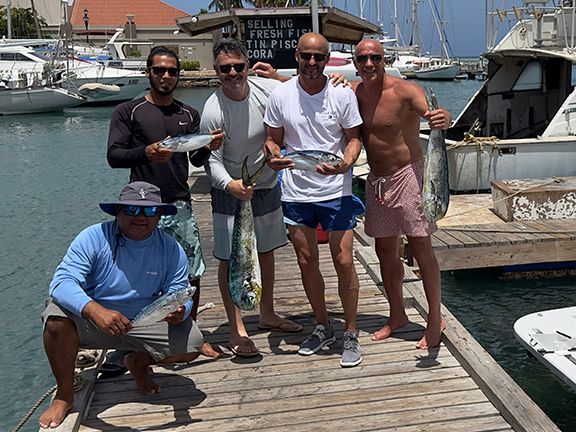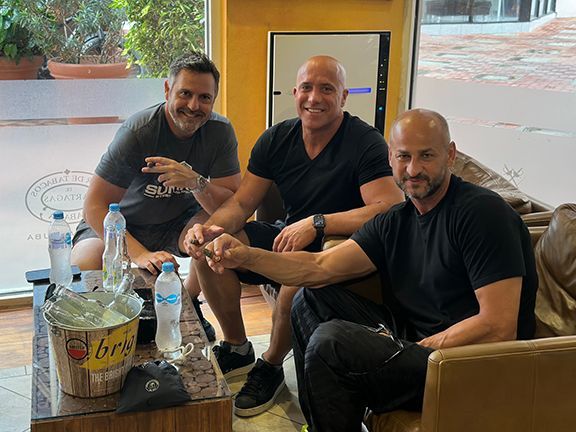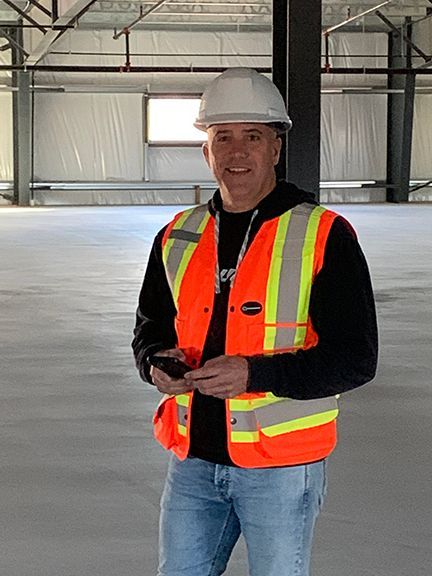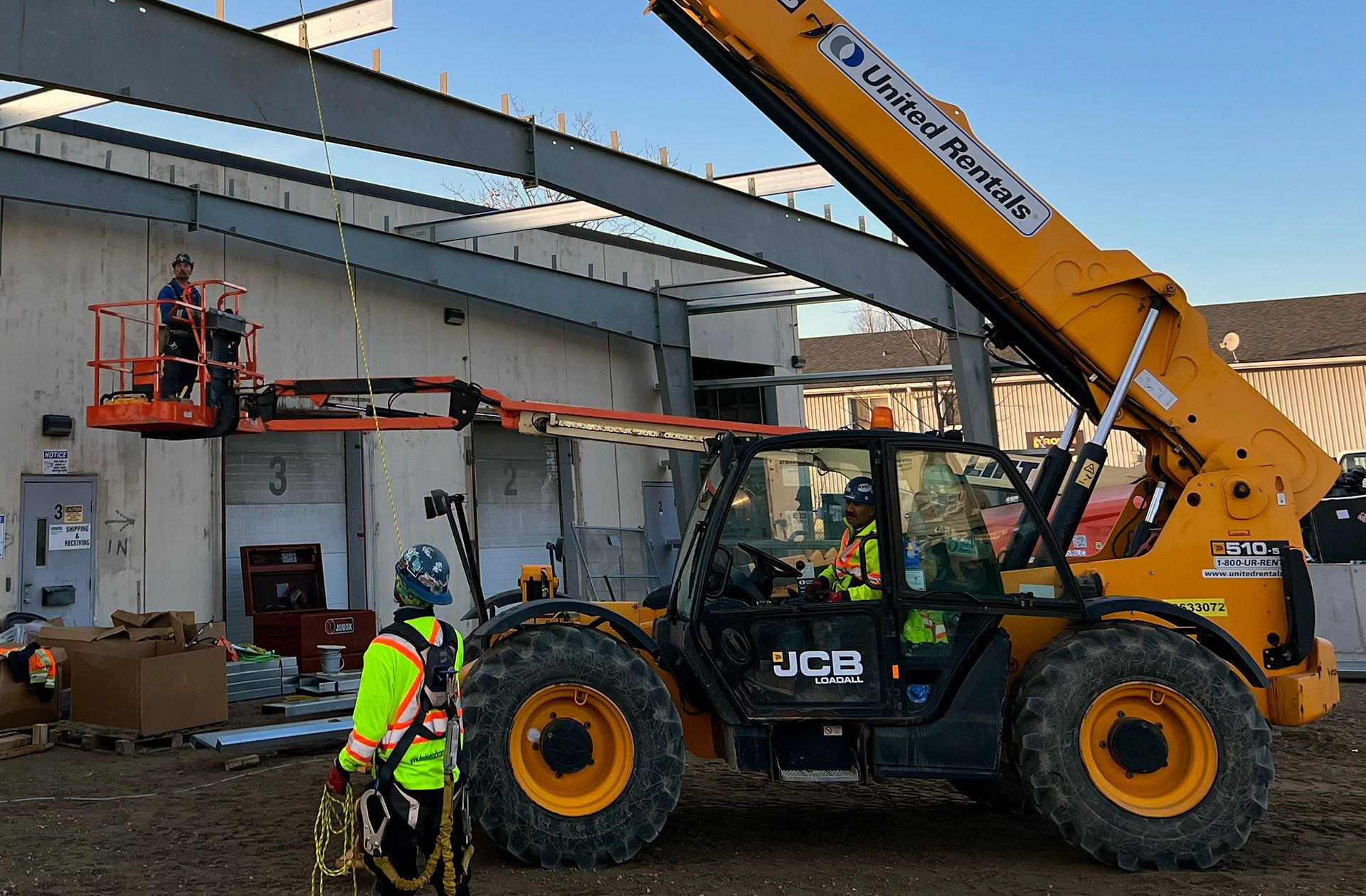Lessons I’ve Learned From a Lifetime Career in Metal Building Architecture and Engineering
Frank Melo • December 5, 2024
Frank Melo answers questions to provide career advice and perspective from his experience leading and managing pre-engineered steel construction projects across North America.
Mentorship is an essential part of the trades. Most skilled tradespeople get their start as apprentices and it’s a key way for the next generation of professionals to learn about the craft. I got my start at an early age working closely with my father. He was a huge inspiration who taught me so much, and who helped me develop my love for building that continues to this day. I find there’s no better feeling than the accomplishment of taking an idea and transforming it into a completed structure or work that people can enjoy for years to come.
Part of good mentorship is giving back. I particularly enjoy training new crew members, listening to and answering their questions and helping provide whatever assistance or tutelage is possible. Our knowledge and experience gets passed along, and the skills and techniques save frustration as they quickly learn a better way to get things done.
As we network through various trade events or association gatherings (I am so excited every time I can meet peers through the Vancouver Regional Construction Association), or with our activities promoting our business online, our team receives job enquiries. And occasionally I get asked questions from ambitious young talent about career growth, which I much prefer. I’m always happy to answer.
Recently, I received a LinkedIn message that got me thinking back to when I was first starting out working with my father. I figured I would turn what I shared into a post about career advice...
Thank you to Nidhi Chaudhari, a promising BIM specialist and architectural technologist who is passionate about sustainable design and reached out to me as someone who’s three years into their architectural design profession. I appreciate the opportunity to share what I’ve learned.

Slide title
Write your caption hereButton
Slide title
Write your caption hereButton
Slide title
Write your caption hereButton
Slide title
Write your caption hereButton
Supportive Teams Create Successful People
Leading complex projects to success outcomes requires building strong relationships, with crews, engineers, architects, our suppliers, clients and even those in competing firms. Every industry can be competitive, but when you’re someone who’s passionate about the construction sector, being involved and getting to know others who are equally excited about their vocation only makes everyone better. Networking and mentoring are the easiest way to establish yourself and build a rewarding career.
No one succeeds by exploring a well-trodden path on their own. It’s vital to build strong connections so you can navigate the challenges of the industry with the help of others. Sometimes a quick suggestion or a little advice goes a long way in transforming how you get things accomplished. I get particularly inspired by how technical expertise can be combined with strong interpersonal skills to create lasting relationships.
Pick a Path and Stick To It
The ability to take a vision and transform it, through architecture and engineering, into a tangible thing is exciting and rewarding that provides plenty of opportunities to grow. My business and career focus has been in specializing on pre-engineered steel buildings. Construction and engineering are such broad fields that it would be impossible for one person to become an expert in everything. I suggest carving out a niche in what you enjoy best and then relying on others who specialize in other areas to form working collaborations that allow you to take on bigger and bigger projects without stretching your talents and workload too thin. I have connections with architects, plumbers, electricians, surveyors, engineers, painters, truckers, suppliers, manufacturers, crane operators and administrators who can be delegated specific responsibilities that can get done while I focus my efforts elsewhere.
Taking on too many responsibilities is the quickest path to burnout and frustration. Teamwork truly makes the dream work.
Four Suggestions For Career Growth
Here are other practical ways people can accelerate their career path and improve their opportunities to get where they want to be.
1. Advice for starting out:
Focus on developing both your technical and interpersonal skills. Employers value team players who can collaborate effectively while bringing technical expertise to the table. Seek out internships or entry-level roles that expose you to various aspects of construction management, and always be proactive in seeking feedback and learning opportunities.
2. Develop key skills and earn certifications:
Early in my career, I found that having strong technical knowledge was crucial. Certifications like Project Management Professional (PMP), Construction Safety Training Systems (CSTS), and specialized training in steel construction made a significant difference. Building a solid understanding of project estimation, scheduling and structural design was also invaluable. In Canada, familiarity with building codes and regulations (e.g., National Building Code of Canada) is essential.
3. Building connections:
Networking is key in this industry. I recommend joining professional organizations like the Canadian Construction Association (CCA) or your local construction association. Attend industry events, seminars, and trade shows to meet peers and potential mentors. LinkedIn is also a fantastic tool – engage with posts, share your insights and connect with professionals who inspire you.
4. Navigating challenges:
The industry can be fast-paced and demanding, but resilience and adaptability go a long way. Emphasize your willingness to learn and don’t shy away from taking on challenging projects. Understanding cultural nuances in communication and work styles within the Canadian industry culture is also helpful.
Good Luck and Thank You!
I hope my perspective will be helpful for those starting out on their career journey. I usually end up learning as much as I give when I speak with others. Most people when asked are willing to share their experiences to help encourage the next generation. Of course, not everyone is as open so don’t get disheartened when a busy manager can’t make time to help.
I want to emphasize how important it is to be resilient and adaptable. It’s a reminder to embrace challenges as opportunities to grow and stay motivated to continue developing both your technical expertise and industry connections.
In case it’s helpful, here’s a list of the types of professional connections I’ve built over the years:
1. Structural Engineers
2. Project Managers
3. Construction Foremen
4. Steel Erectors
5. Welders
6. Crane Operators
7. Riggers
8. Concrete Contractors
9. Electrical Contractors
10. Roofing Specialists
11. Cladding Specialists
12. HVAC Installers
13. Steel Fabricators
14. Fasteners and Hardware Suppliers
15. Roofing and Insulation Providers
16. Equipment Rental Companies
17. Architects
18. Building Code Consultants
19. Environmental Engineers
20. Permitting Officials
21. Safety Inspectors
22. Structural Inspectors
23. Real Estate Developers
24. Industrial Clients
25. Agricultural Clients
26. General Contractors
27. Bankers
28. Financial Advisors
29. Insurance Providers
30. Legal Advisors
About the author:
Frank Melo
has a construction civil engineering technology and business background with over 25 years of experience as a business owner and contractor. He was born and educated in London, Ontario and now divides his time between projects primarily in Ontario and British Columbia. He can be contacted at Double Black Construction at (778) 951-4766
or by email at frank@doubleblackconstruction.com
or through LinkedIn.
You might also like
Book a Service Today
Thank you for contacting us.
We will get back to you as soon as possible
We will get back to you as soon as possible
Oops, there was an error sending your message.
Please try again later
Please try again later
Proud Member
Cost-Effective & Reliable
Contact us for a free quote & preliminary drawings.
Location
201 - 30610 Progressive Way
Abbotsford, B.C. V2T 6Z2 Canada
info@DoubleBlackConstruction.com
Call
833-322-2722
Navigation:
Our Focused Services:
Working hours (Pacific Standard)
- Mon - Fri
- -
- Sat - Sun
- Appointment Only
© 2025
All Rights Reserved | Double Black Construction, 2023.








